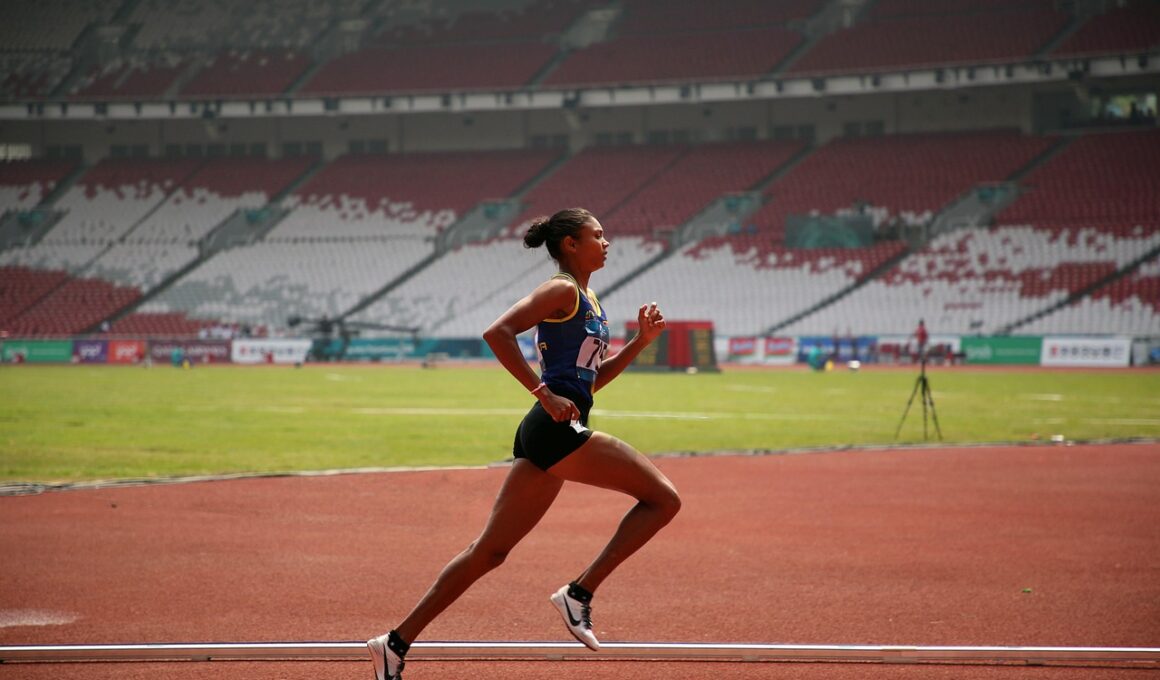Developing a Winning Mindset for Fitness Competitions
Achieving success in fitness competitions requires not only physical preparation but also a powerful mindset. A winning mindset involves a comprehensive mental framework that fosters resilience, focus, and motivation. This mindset will allow athletes to push through challenges and maintain dedication during intense training sessions leading up to competitions. To develop such a mindset, competitors should engage in practices like visualization and positive affirmation. Visualization involves imagining successful performance scenarios. This technique enhances confidence and reduces anxiety. Positive affirmations, on the other hand, empower athletes to replace self-doubt with self-belief. By reminding themselves of their strengths and past successes, competitors can shift their focus from fear of failure to excitement about possibilities. Additionally, surrounding oneself with a supportive environment, including coaches and fellow competitors, creates a community that encourages and inspires. Building this network of like-minded individuals is essential in cultivating a positive mindset. Regularly sharing victories and challenges with this group can help maintain motivation and inspire growth. With the right mental tools in place, athletes can significantly enhance their performance in competitions and better face the inevitable ups and downs of the fitness journey.
Goal setting is an integral part of developing a winning mindset in fitness competitions. Clearly defined goals provide direction and a roadmap to success. It is essential for competitors to categorize their goals into short-term and long-term ones. Short-term goals allow athletes to track progress and maintain motivation, while long-term goals give them a broader vision of what they aspire to achieve. To effectively set goals, utilizing the SMART criteria is highly beneficial. SMART stands for Specific, Measurable, Achievable, Relevant, and Time-bound. Crafting goals that meet these criteria ensures that they are realistic and attainable. For instance, instead of saying, “I want to be fit,” a SMART goal would be, “I will train five times a week and prepare for a specific competition in six months.” Moreover, regularly reviewing these goals keeps them fresh in an athlete’s mind and allows for adjustments as circumstances change. Competitors should celebrate small victories along the way to stay motivated. This positive reinforcement helps in maintaining enthusiasm and commitment toward achieving their ultimate goals in fitness competitions.
The Importance of Mental Visualization
Mental visualization is a powerful technique for athletes preparing for fitness competitions. By creating mental images of successful performances, competitors can significantly enhance their confidence and focus. This practice involves imagining oneself in competition, going through every detail and movement needed to perform at their best. Research shows that mental rehearsal can improve actual performance, as the brain often cannot distinguish between real and imagined experiences. Regular practice of visualization helps athletes become familiar with competition scenarios, leading to reduced anxiety on competition day. To effectively incorporate visualization into a training routine, competitors should set aside time to focus on this exercise. They might use specific cues, such as breathing techniques or calming music, to enhance concentration. Furthermore, it’s vital to include positive outcomes in these visualizations, such as winning or achieving personal bests. This approach allows athletes to associate mental visualization with positive emotions and feelings of success. Over time, athletes will find that visualization not only boosts their performance but also enhances their overall mentality during competitions, promoting a sense of calm and assurance.
Another crucial element of a winning mindset is developing resilience. Resilience is the ability to adapt and recover from setbacks, which are part of any competitive journey. Athletes often face injuries, poor performances, or other obstacles that could derail their progress. Embracing resilience means viewing these challenges as learning opportunities rather than failures. Working on mindset resilience includes practicing self-compassion and maintaining a balanced perspective. Athletes should learn to acknowledge their feelings without judgment, fostering a healthy relationship with the ups and downs of competition. Keeping a journal can be helpful in processing experiences and emotions during this journey. Journaling allows competitors to reflect on successes, failures, and the lessons learned from each. This practice encourages critical thinking and promotes personal growth. Additionally, resilience can be bolstered through the use of coping strategies, such as mindfulness and stress management techniques. Mindfulness practices can help athletes stay present and focused, especially during high-pressure situations. By cultivating resilience, fitness competitors will find it easier to navigate the unpredictable nature of their sport, ultimately enhancing their overall performance.
The Role of Physical Fitness
While developing a winning mindset is critical, physical fitness plays an equally important role in fitness competitions. Physical well-being underpins an athlete’s capability to perform at high levels and influences confidence. Consistent training designed to improve strength, endurance, and agility is essential for competitive success. Athletes should tailor their workout routines to enhance the specific skills required for their competitions. For instance, they may need to incorporate high-intensity interval training (HIIT) to improve cardiovascular fitness or resistance training to build strength. Additionally, nutrition is a key component of physical fitness that athletes cannot overlook. A balanced diet fuels the body, aids recovery, and enhances performance. Proper hydration is also vital, as dehydration can significantly hinder performance and focus. Athletes should develop an individualized nutrition plan that supports their training goals and maintains energy levels. Regularly consulting with a nutritionist can ensure that dietary choices align with their performance needs. Moreover, rest and recovery cannot be neglected, as they are crucial in preventing injury and ensuring peak performance during competitions. Therefore, achieving a harmonious balance between mental and physical fitness is essential for competitive success.
Developing a winning mindset in fitness competitions also involves mastering the art of visualization and mental rehearsal. Athletes can perform mental practices that mirror their physical training. This can include imagining themselves executing movements perfectly or overcoming challenges during competitions. This kind of mental training contributes to greater readiness and confidence when facing actual performance situations. Moreover, staying connected with one’s purpose and passion in fitness is essential for sustaining motivation. Athletes should remind themselves why they started this journey in the first place. Reflecting on personal motivations—such as improving health, achieving personal bests, or inspiring others—can keep the fire of motivation alive during tough times. Sharing these motivations with coaches, friends, or family can also build a support system that keeps athletes accountable. Regularly reconnecting with goals and motivations helps maintain a strong mental framework throughout the competitive season. Additionally, learning to practice gratitude can be immensely beneficial. Expressing appreciation for the journey keeps athletes grounded and appreciative of their progress, reinforcing a positive mindset that enhances overall performance.
Conclusion: Embracing the Competition Journey
Embracing the entire journey of competition is vital in developing a winning mindset. Fitness competitions are not just about the final outcome; they encompass the growth, struggles, and transformations that occur during the process. Understanding that setbacks can be stepping stones to success allows athletes to approach competitions with a growth mindset. It is essential to remain adaptable as circumstances evolve, whether dealing with injuries or unexpected challenges during training. Fostering a mindset that views every experience—be it positive or negative—as a learning opportunity promotes long-term growth. Competitors should focus on progress rather than perfection, celebrating small victories along the way. Building strong relationships with fellow competitors, coaches, and support networks can further enhance motivation and resilience. Having a reliable circle of support makes the competition experience more enjoyable and enriching. Reflecting on this journey continually invites athletes to recognize their personal evolution and achievements. Ultimately, adopting a winning mindset requires dedication, practice, and a profound understanding of the self. By embracing the totality of the experience, fitness competitors will uncover the strength and passion needed to pursue their goals relentlessly.
As competitors train and prepare, they must focus on fostering dedication, resilience, and adaptability. Developing a winning mindset is an ongoing process, one that requires constant nurturing and attention alongside physical training. The journey will undoubtedly include obstacles, but those who remain committed to the process will surely experience growth and success in their fitness competitions.


